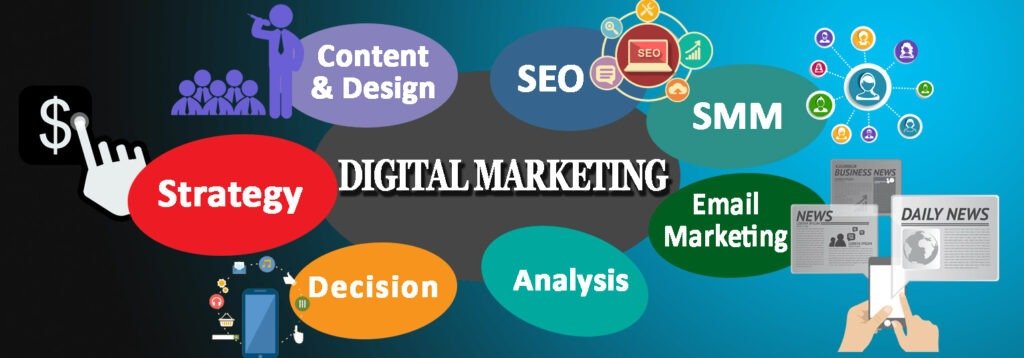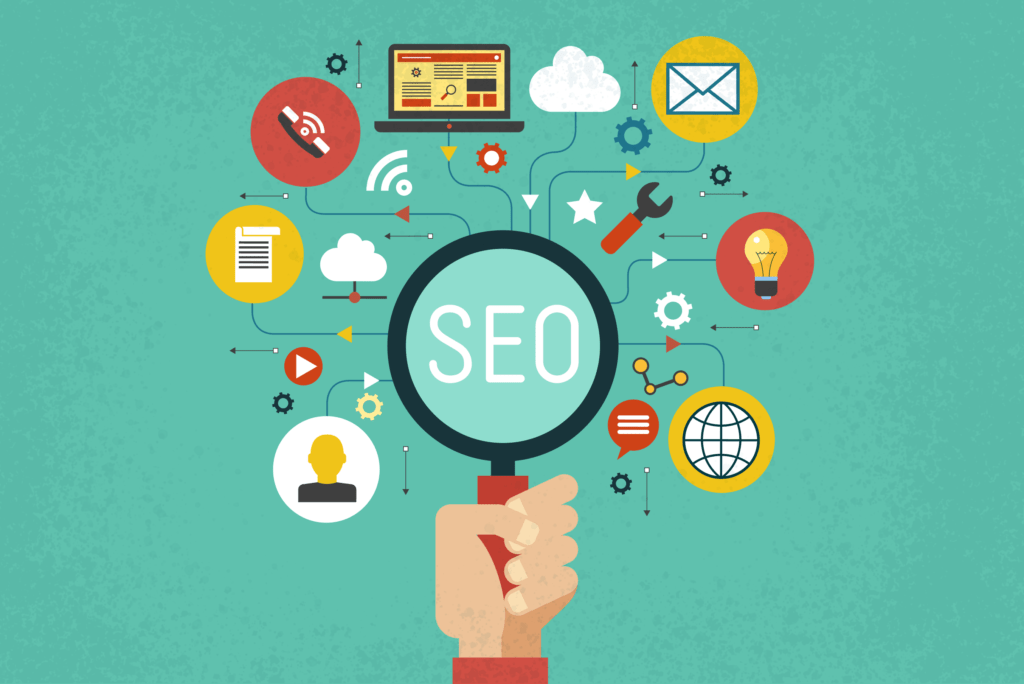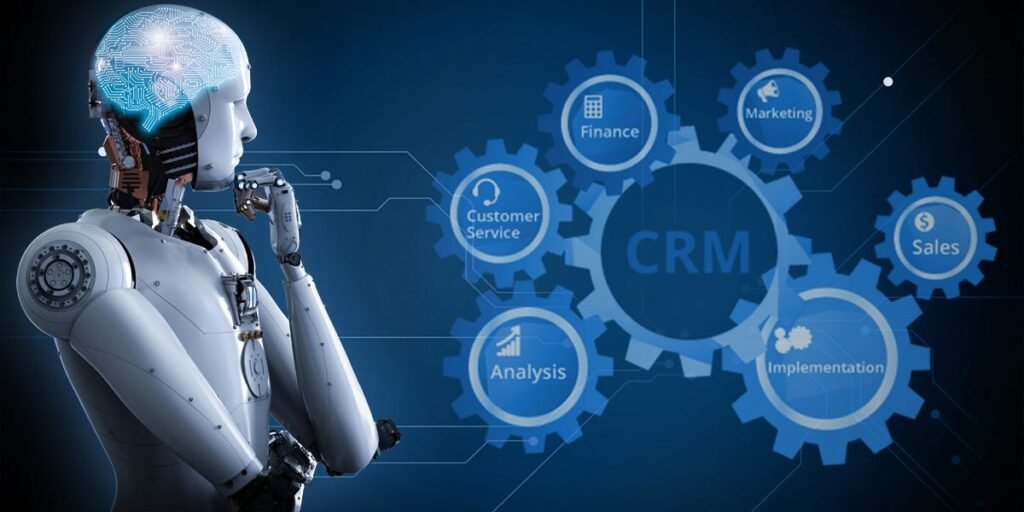The digital marketing landscape has undergone significant evolution over the years, driven by advancements in technology, changes in consumer behavior, and emerging trends. In this comprehensive exploration of the evolution of digital marketing trends and predictions for the future, we will delve into its historical roots, trace its transformative journey, and forecast emerging trends and predictions shaping the future of this dynamic industry.
1. The Early Days of Digital Marketing
In the early days of the internet, digital marketing was in its infancy. Marketers experimented with rudimentary online advertising methods such as banner ads, email marketing, and basic websites to connect with consumers in the digital realm.In the early days of digital marketing, strategies were rudimentary, primarily relying on basic online advertising methods such as banner ads, email marketing, and simple websites. Marketers experimented with these tools to connect with audiences in the emerging digital landscape. While these methods lacked sophistication compared to modern digital marketing practices, they laid the foundation for the evolution of evolution of digital marketing as technology and consumer behavior continued to evolve.

2. The Rise of Search Engine Optimization (SEO)
The emergence of search engines like Yahoo, AltaVista, and eventually Google revolutionized digital marketing. Marketers realized the importance of optimizing their websites to improve search engine rankings and attract organic traffic, laying the groundwork for modern SEO practices.The rise of search engine optimization (SEO) revolutionized digital marketing, empowering businesses to improve their online visibility and attract organic traffic. Marketers realized the importance of optimizing their websites to align with search engine algorithms, thus enhancing their rankings in search results. With SEO, businesses could effectively target relevant keywords, optimize their content, and earn higher visibility, ultimately driving more qualified traffic to their websites and improving their overall online presence.

3. Social Media: A Game-Changer in Digital Marketing
The rise of social media platforms such as Facebook, Twitter, and LinkedIn transformed the digital marketing landscape. Marketers embraced social media as a powerful tool for engaging with audiences, building communities, and amplifying brand messaging in real-time.Social media emerged as a game-changer in digital marketing, providing businesses with unprecedented opportunities to engage with audiences on a personal level. Platforms like Facebook, Twitter, and LinkedIn allowed marketers to create communities, share content, and interact with customers in real-time. Through targeted advertising and strategic content creation, businesses could amplify their brand messaging and build relationships with consumers. Social media became an integral part of digital marketing strategies, enabling brands to connect with their audience in a more meaningful way.

4. Content Marketing: The Shift towards Value-driven Content
Content marketing emerged as a pivotal strategy in digital marketing, emphasizing the creation and distribution of valuable, relevant, and consistent content to attract and retain a target audience. Brands began producing high-quality content to establish thought leadership, drive engagement, and foster customer loyalty.Content marketing marked a significant shift towards creating valuable and relevant content to engage with target audiences. Instead of traditional advertising tactics, businesses began focusing on providing informative, entertaining, or educational content that resonated with consumers. This approach aimed to build trust, establish authority, and foster long-term relationships with customers. By delivering value through content, businesses could attract and retain loyal followers who were more likely to convert into customers over time.

5. Mobile Optimization: Meeting the Needs of On-the-Go Consumers
The proliferation of smartphones and mobile devices prompted marketers to optimize their digital experiences for mobile users. Mobile marketing strategies such as responsive web design, mobile apps, and location-based targeting became essential for reaching consumers on-the-go and delivering personalized experiences.Mobile optimization addresses the demands of consumers who are constantly on the move. It ensures that websites and digital content are easily accessible and functional on mobile devices such as smartphones and tablets. With the increasing reliance on mobile devices for internet browsing and shopping, optimizing for mobile responsiveness has become essential for businesses to provide a seamless user experience and meet the needs of on-the-go consumers.

6. Personalization and Customer Experience
As consumer expectations evolved, marketers shifted their focus towards delivering personalized experiences across digital channels. Leveraging data analytics and artificial intelligence (AI), marketers could tailor content, offers, and recommendations to individual preferences, enhancing customer satisfaction and loyalty.Mobile optimization addresses the demands of consumers who are constantly on the move. It ensures that websites and digital content are easily accessible and functional on mobile devices such as smartphones and tablets. With the increasing reliance on mobile devices for internet browsing and shopping, optimizing for mobile responsiveness has become essential for businesses to provide a seamless user experience and meet the needs of on-the-go consumers.

7. Video Marketing: The Rise of Visual Storytelling
Video marketing emerged as a dominant force in digital marketing, offering brands a compelling medium for storytelling, engagement, and brand building. Platforms like YouTube, TikTok, and Instagram Stories provided marketers with new avenues to connect with audiences through immersive and visually appealing content.Video marketing has experienced a surge in popularity, marked by the emergence of visual storytelling as a powerful marketing tool. Platforms like YouTube, TikTok, and Instagram Stories have provided marketers with new avenues to connect with audiences through compelling visual content.

8. Artificial Intelligence (AI) in Marketing
Artificial intelligence (AI) revolutionized digital marketing by enabling marketers to harness the power of data and automation. AI-driven technologies such as chatbots, predictive analytics, and personalized recommendations transformed customer interactions, campaign optimization, and decision-making processes.Artificial Intelligence (AI) has revolutionized marketing, empowering businesses to leverage data-driven insights and automation to enhance their marketing efforts. AI-driven technologies such as machine learning, predictive analytics, and natural language processing enable marketers to analyze vast amounts of data, personalize customer experiences, and optimize marketing campaigns in real-time.

9. Future Trends and Predictions
Looking ahead, the future of digital marketing is poised to be shaped by emerging technologies, changing consumer behaviors, and evolving industry trends. From the rise of voice search and augmented reality (AR) to the growing importance of privacy and data protection, marketers must anticipate and adapt to these developments to remain competitive in a rapidly evolving digital landscape.Future trends and predictions in digital marketing are shaped by emerging technologies, changing consumer behaviors, and evolving industry landscapes. From the rise of voice search and augmented reality (AR) to the growing importance of privacy and data protection, marketers must anticipate and adapt to these developments to remain competitive in a rapidly evolving digital landscape.

10. Conclusion
The evolution of digital marketing has been characterized by continuous innovation, adaptation, and transformation. From its early beginnings to its current state of sophistication, digital marketing has become an indispensable tool for businesses seeking to thrive in the digital age. By understanding its historical roots, embracing emerging trends, and anticipating future developments, marketers can position themselves for success in an ever-changing digital landscape.This comprehensive exploration of the evolution of digital marketing provides valuable insights into the historical developments, transformative trends, and future predictions shaping the dynamic industry.



Leave a Reply